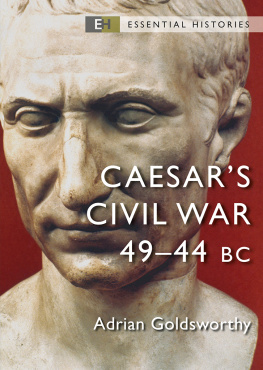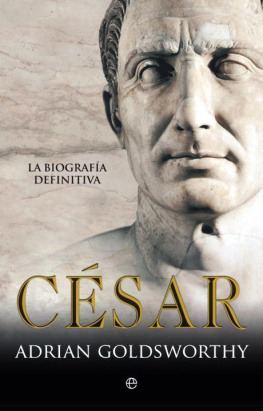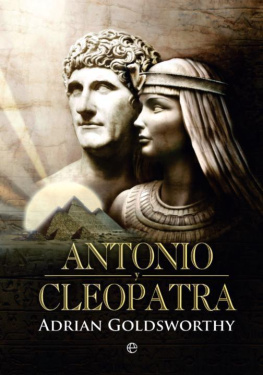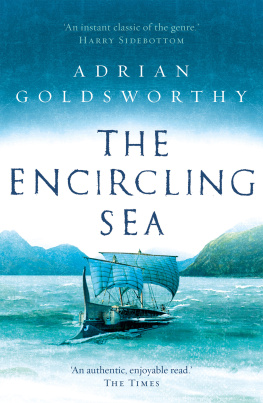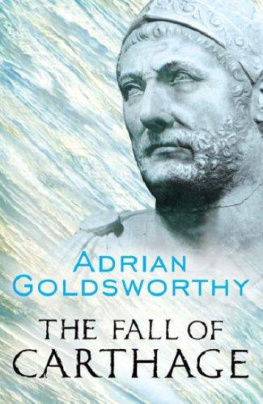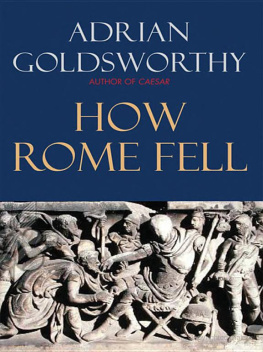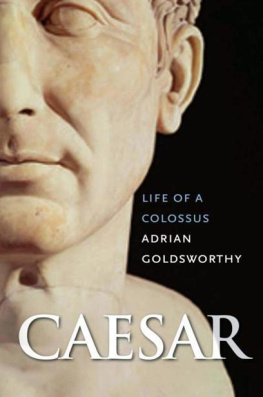Goldsworthy Adrian - Pax Romana
Here you can read online Goldsworthy Adrian - Pax Romana full text of the book (entire story) in english for free. Download pdf and epub, get meaning, cover and reviews about this ebook. City: S.I, year: 2016, publisher: Yale University Press;Tantor Media, Inc, genre: Politics. Description of the work, (preface) as well as reviews are available. Best literature library LitArk.com created for fans of good reading and offers a wide selection of genres:
Romance novel
Science fiction
Adventure
Detective
Science
History
Home and family
Prose
Art
Politics
Computer
Non-fiction
Religion
Business
Children
Humor
Choose a favorite category and find really read worthwhile books. Enjoy immersion in the world of imagination, feel the emotions of the characters or learn something new for yourself, make an fascinating discovery.

- Book:Pax Romana
- Author:
- Publisher:Yale University Press;Tantor Media, Inc
- Genre:
- Year:2016
- City:S.I
- Rating:3 / 5
- Favourites:Add to favourites
- Your mark:
- 60
- 1
- 2
- 3
- 4
- 5
Pax Romana: summary, description and annotation
We offer to read an annotation, description, summary or preface (depends on what the author of the book "Pax Romana" wrote himself). If you haven't found the necessary information about the book — write in the comments, we will try to find it.
Pax Romana — read online for free the complete book (whole text) full work
Below is the text of the book, divided by pages. System saving the place of the last page read, allows you to conveniently read the book "Pax Romana" online for free, without having to search again every time where you left off. Put a bookmark, and you can go to the page where you finished reading at any time.
Font size:
Interval:
Bookmark:
PAX ROMANA
By Adrian Goldsworthy
FICTION
True Soldier Gentlemen
Beat the Drums Slowly
Send Me Safely Back Again
All in Scarlet Uniform
Run Them Ashore
Whose Business Is to Die
NONFICTION
The Roman Army at War, 100 BCAD 200
Roman Warfare
The Fall of Carthage
Cannae: Hannibals Greatest Victory
The Complete Roman Army
The Men Who Won the Roman Empire
In the Name of Rome
Caesar: The Life of a Colossus
The Fall of the West: The Death of the Roman Superpower
Antony and Cleopatra
Augustus: From Revolutionary to Emperor
Pax Romana: War, Peace and Conquest in the Roman World
War, Peace and Conquest in the Roman World
ADRIAN GOLDSWORTHY

First published 2016 in the United States by
Yale University Press and in Great Britain by
Weidenfeld & Nicolson, an imprint of
The Orion Publishing Group Ltd.
Copyright Adrian Goldsworthy 2016.
All rights reserved.
This book may not be reproduced, in whole or in part, including illustrations, in any form (beyond that copying permitted by Sections 107 and 108 of the U.S. Copyright
Law and except by reviewers for the public press), without written permission from the publishers.
Yale University Press books may be purchased in quantity for educational, business, or promotional use.
For information, please e-mail
(U.S. office) or (U.K. office).
Typeset by Input Data Services Ltd, Bridgwater, Somerset.
Printed in the United States of America.
Library of Congress Control Number: 2016941493
ISBN: 978-0-300-17882-1 (hardcover: alk. paper)
A catalogue record for this book is available from the British Library.
This paper meets the requirements of ANSI/NISO
Z39.48-1992 (Permanence of Paper).
10 9 8 7 6 5 4 3 2 1
A book like this takes a long time to write and many others contribute to the process. As always I must express my heartfelt thanks to the family and friends who have read and commented on various drafts of the manuscript, especially Kevin Powell, Ian Hughes, Philip Matyszak, Guy de la Bdoyre and Averil Goldsworthy. Dorothy King has listened with patience and discussed many of the ideas expressed in this book. Particular thanks must go to my agent, Georgina Capel, for her enthusiasm and for creating the situation allowing me to take the time to write this book properly. Thanks must also go to my editors, Alan Samson in the UK and Steve Wasserman in the USA, and their teams for producing so handsome a volume.
Pax Romana is one of those Latin expressions that journalists and cartoonists still expect their readers to understand without the need for translation, alongside tags such as mea culpa and Shakespeares et tu Brute. A cartoonist can depict a modern politician in toga, sandals and laurel wreath and invoke Julius Caesar or a generic Roman emperor and know that people will think of a leader betrayed by those close to him, or of one prey to pride and folly like Caligula or Nero. Few schools teach Latin or Greek, but TV documentaries about Rome are common, and dramas appear every so often, tending these days towards ever more lurid pictures of a world of treachery, sex and violence blood and buttocks rather than the old sword and sandals. Such caricatures tell us little about the ancient past and a good deal about current tastes in entertainment, but it is striking that their makers are confident setting these stories in a Roman context because they feel that the audience will recognise that world.
The Romans continue to fascinate us even though more than fifteen centuries have passed since the collapse of the Roman Empire in the West. In language, law, ideas, place names and architecture they have had a profound influence on Western culture, and much of this has passed on to regions wholly unknown to the Romans. Many leaders and states from Charlemagne onwards have done their best to invoke the spirit of Rome and the Caesars as justification for their own power. Rome often appears in debates in the USA about their countrys role in the world and its future, and is used by people of all political persuasions. The use of military force and diplomatic pressure to spread a Pax Americana across the wider world is held up as an aspiration by some and depicted as a sinister plot by others.
The words come in a biography praising Tacitus father-in-law, Agricola, and precede a dramatic account of a battle in which this man defeats the Caledonian tribes. Both in this work and his others, it is hard to see the author as a devout critic of the Roman Empire, and the overwhelming tone of literature from the Roman period is one of celebration of power and success. Obviously this does not come as a surprise, since it is human nature to want to think well of ourselves. Like most imperial powers, the Romans felt that their domination was entirely right, divinely ordained and a good thing for the wider world. Emperors boasted that their rule brought peace to the provinces, benefiting the entire population.
Yet the Roman Empire was remarkably successful for a very long time, the Pax Romana holding sway over much of Western Europe, the Middle East and North Africa for centuries. This area was stable and apparently prosperous, with little or no trace of desolation. Roman Peace does appear to have been a reality, for rebellions and large-scale violence were extremely rare. Even critics of empires must concede this about Rome. By any standards the Roman Empire was unusual, and this apart from its continuing fascination and appearance in current debates makes it all the more important to understand what Roman Peace really meant. It matters if it was solely the product of bluntly wielded military power and oppression, or of subtler, more insidious methods of coercion. As important is some understanding of the cost of imperial rule to the subject population and how these felt about being part of a foreign empire. A significant proportion of the worlds inhabitants lived in the Roman Empire and that in itself is a good reason to wish to understand what this meant. It is well worth asking how complete and secure the Pax Romana actually was, but from the start we ought to think a little about just what peace means.
I was born in peacetime, the child of parents who had lived through the Second World War. My mother was a small child during the Blitz in Cardiff, and still remembers the air raid siren wailing, the fear of going into the dark and cold air raid shelter in their garden, the different sounds of bombs, land-mines and anti-aircraft guns, the patter of falling shrapnel, the stench after a raid and the houses reduced to rubble, sometimes with people buried underneath. She also speaks about she and her friends staging concerts and collecting pennies to buy a Spitfire, of uniforms everywhere and of being unable to cross the street because of the stream of trucks carrying GIs and supplies on their way to the docks to embark for Normandy. The memories are still vivid today and very immediate whenever she talks about those years. My father was an apprentice in the Merchant Navy, did the Atlantic run, and then was in the Mediterranean supporting the landings in Tunisia and Italy. His ship was in the Bay of Naples when Vesuvius erupted in 1944, and he remembered having to clean ash off the deck. Only occasionally would he speak of the constant threat of U-Boats and air attack, of ammunition ships exploding and the sea on fire from burning fuel, with men trying to swim to safety through it. He left the Merchant Navy and was soon old enough to be conscripted into the Army, and served in Palestine under the British Mandate, caught between Jewish and Arab militants and a target for both. His father had served through the First World War on the Western Front, at Gallipoli and in Egypt and Palestine. Neither were professionals. They had done their bit like millions of their contemporaries and then happily returned to civilian life.
Next pageFont size:
Interval:
Bookmark:
Similar books «Pax Romana»
Look at similar books to Pax Romana. We have selected literature similar in name and meaning in the hope of providing readers with more options to find new, interesting, not yet read works.
Discussion, reviews of the book Pax Romana and just readers' own opinions. Leave your comments, write what you think about the work, its meaning or the main characters. Specify what exactly you liked and what you didn't like, and why you think so.


